September 27, 2025 – North America East Coast Lecture Tour (2) New York
Hello. Today, Sunim is giving the second lecture of his North America East Coast tour in New York.
After returning to his accommodation at 10:20 PM last night, Sunim rested briefly before conducting a live broadcast of the Jungto Dharma School entrance ceremony at 1 AM local time (2 PM Korean time). This September, approximately 1,900 students from both Korea and abroad enrolled in the Jungto Dharma School.
After watching a congratulatory performance by a graduate of the Jungto Dharma School, there was time to hear reflections from the new students. Listening to each person’s thoughts, one could feel the excitement and anticipation of this new beginning. Following the welcoming remarks from the President of Jungto Society, everyone requested a commemorative Dharma talk from Sunim. Sunim first expressed his congratulations and then provided a detailed introduction to what students would learn at the Jungto Dharma School.
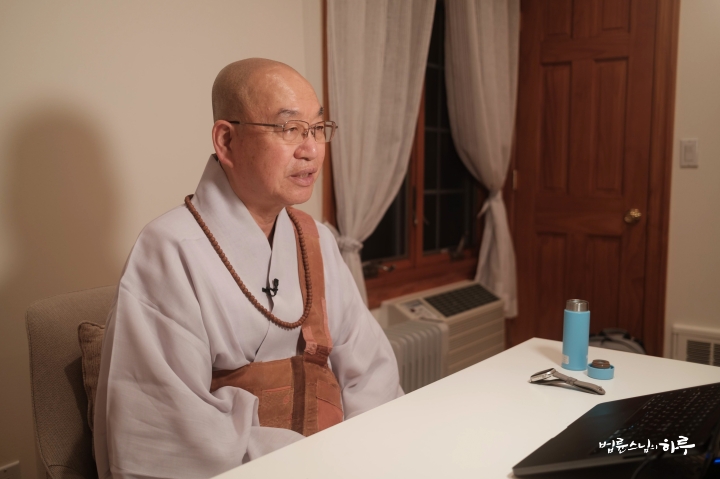
“I sincerely congratulate you on your admission to the Jungto Dharma School. At the Jungto Dharma School, we don’t study by saying ‘This is what the Buddha said’ and then trying to apply it to our daily lives. Instead, we start by examining our own problems first. We carefully examine our state by asking, ‘How am I living right now?’ Then we can recognize: ‘I’m living with stress,’ ‘I’m living sadly,’ ‘I have hatred,’ ‘I have resentment,’ ‘I have loneliness,’ ‘I have anxiety,’ ‘I have restlessness,’ ‘I have worry,’ ‘I have concern,’ ‘I have suffering.’ When we see that our current mental state is negative like this, we philosophically describe it in one word: ‘suffering.’
Jungto Dharma School: A Place to Learn Through Experience, Not Knowledge
Once we diagnose that we are currently in a state of suffering, we then examine why we have come to be in such a suffering state. Then we can realize that we suffer because of our attachment to wanting things our way, and when things don’t go as we want, we suffer. If we remove the cause—that is, if we let go of attachment—there will be nothing to suffer about. Then we study from the perspective of ‘How can we let go of attachment, let go of greed, and break through ignorance?’ It is very important to have this systematic approach of viewing our problems through problem (suffering), cause (origin), cessation (cessation), and method (path). The Buddha called these the Four Noble Truths. In Chinese characters, they are organized as: suffering (苦), origin (集), cessation (滅), and path (道). They can be described as suffering, the cause of suffering, the cessation of suffering, and the path leading to the cessation of suffering.
Rather than memorizing ‘The Buddha’s teaching is the Four Noble Truths of suffering, origin, cessation, and path,’ we start from our own problems, examine whether our state is one of suffering, investigate why we’ve reached this state, remove the cause to eliminate suffering, and practice staying aware of our mental state to maintain the state where suffering has ceased. It’s not about knowing the knowledge of ‘suffering-origin-cessation-path,’ but about practicing to always examine things from this perspective whenever a problem arises. For example, let’s say you get angry. You examine ‘Why am I angry?’ look for the cause, and when you remove that cause, the anger disappears as you realize ‘There’s nothing to be angry about.’ Then you study how to prevent anger from arising in the future.
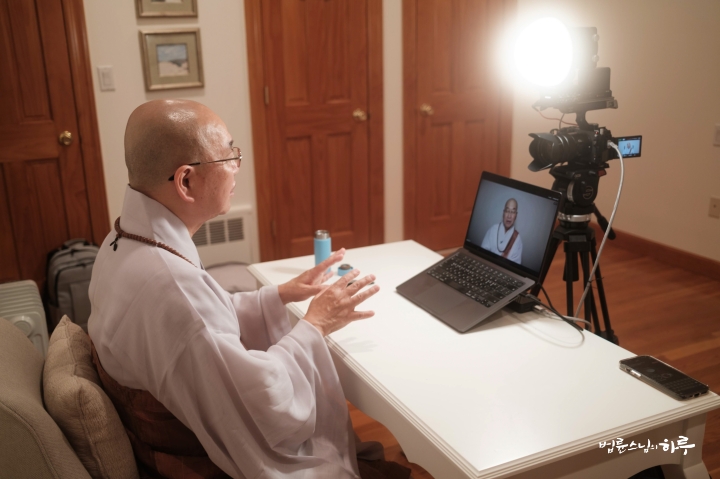
If we were free from such suffering, how would we see this world? Is the world we’re seeing now the real world? Or are we seeing it through colored glasses? What is the truth? This world is not a collection of independent entities but consists of countless things that exist in interconnection with each other. All beings are connected temporally and spatially. Temporally, because things change, there are always causes and effects. This is expressed as ‘impermanence (無常).’ Spatially, because everything is interconnected, there is no independent entity. This is expressed as ‘non-self (無我).’ When we realize impermanence and non-self, there is no reason to suffer. When we mistakenly believe things are permanent and have substantial existence, suffering arises. In this way, we explore the principles of how our minds work. At Jungto Dharma School, we don’t study Buddha’s teachings as mere knowledge, but rather study the principles of why we suffer and how to achieve a state free from suffering.
In Dharma Q&A, when someone asks about their suffering, I have a conversation with them to identify the cause of their suffering and say, ‘If you look at it this way, there’s no suffering, right?’ We discuss specific cases through dialogue. On the other hand, Jungto Dharma School is where we study the underlying principles that form the basis for resolving people’s suffering through Dharma Q&A.
So during your studies at Jungto Dharma School, you need to actually observe when suffering arises when you go home. You observe your relationship with your husband or wife for a week, noting when you feel stressed, what you’re attached to at those times, whether the stress disappeared when you became aware of it, and then share what you’ve actually practiced. This way, you listen to Dharma talks, share your reflections, actually apply them to your life, and share again. This is done once a week under the guidance of a facilitator.
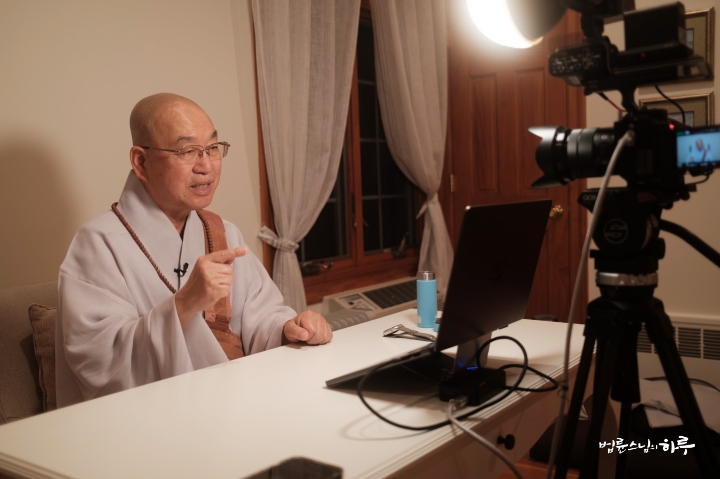
Once a month, each class goes out to the streets together to engage in fundraising activities to help those in need, pick up litter or sort waste by type, participate in peace practice activities, and visit temples together. This way, the program includes practical activities where participants take direct action.
What matters is not what the Buddha or Sunim said. What matters most is ‘How am I?’ In other words, the entire curriculum is designed to help you internalize the Buddha’s teachings. First, listen carefully to the Dharma talks sent via video and fully understand them. Second, select one topic from the Dharma talk content as a practice assignment and experience it directly at home. Third, meet once a week in person to share your impressions of the video Dharma talk and your experiences from practicing at home. Fourth, engage in practical activities on-site once a month and share your reflections again.
These processes may feel somewhat challenging. However, I hope you won’t give up midway and will study consistently so that we can meet all of you again at the graduation ceremony. Graduating from Jungto Dharma School won’t make you money or help you advance in your career. However, it will greatly help you live without suffering. This is not a school that teaches knowledge and skills, nor is it a school that emphasizes faith. It can be described as a school that emphasizes direct experience.
I am currently in New York, USA. I arrived in New York yesterday and gave a lecture for Korean residents in New Jersey. It’s now 2 a.m. My eyes are having trouble staying open, so please bear with me. A practitioner is someone who carries out their given tasks regardless of whether it’s day or night, without being constrained by time. I hope you will study with this perspective as well.”
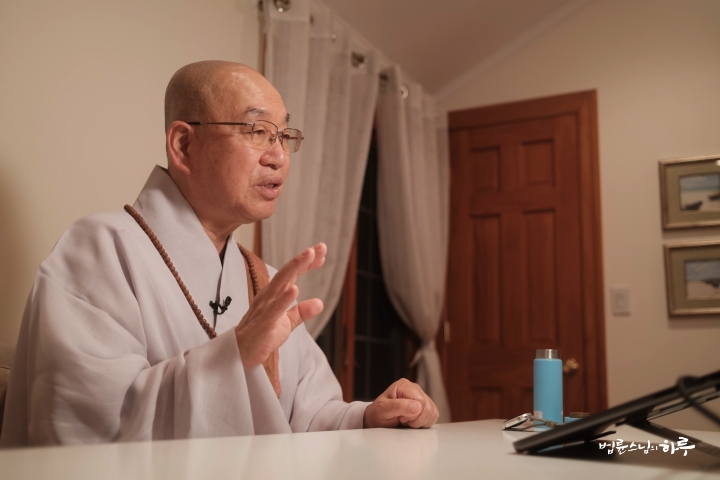
After the Dharma talk ended, all new students entered their respective video conference rooms by group for introductions and greetings. Sunim went to bed after 2:30 AM.
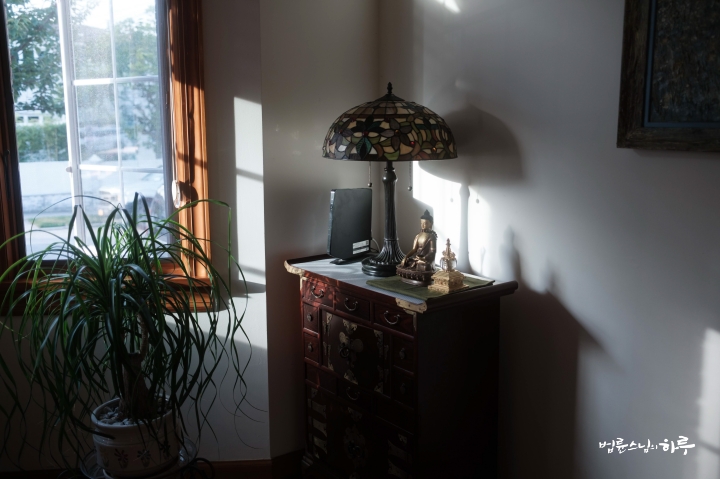
After a brief rest, he woke up at 5:30 AM for morning practice and meditation, followed by breakfast. After the meal, he spent the morning communicating with Korea, handling work matters, and resting. After lunch, he departed for Flushing at 1 PM, where the New York Dharma talk was scheduled.

Today’s Dharma talk was held at the Korean Community Services (KCS) in New York. This organization provides various programs including welfare, education, health, mental health, job training, and immigration support for Korean Americans and immigrants in the New York metropolitan area. Today, Venerable Pomnyun Sunim’s Dharma Q&A was held here.
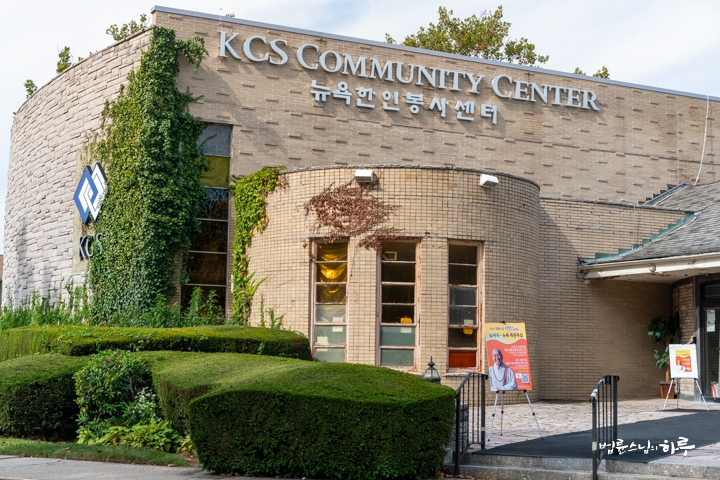
As Sunim entered the venue, volunteers and participants recognized him from the parking lot and greeted him. In particular, Ms. Cha Hyo-soon, former president of New York Jungto Society, warmly welcomed Sunim at the entrance despite being over 80 years old. Many people who had led New York Jungto Society for a long time attended, and Sunim greeted them warmly.
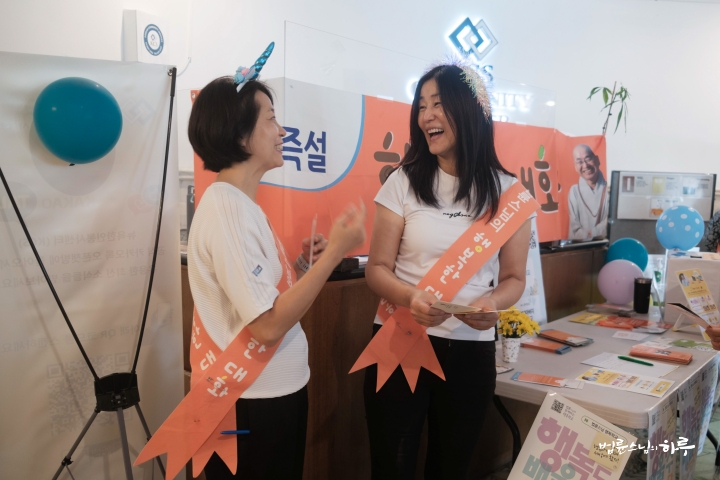
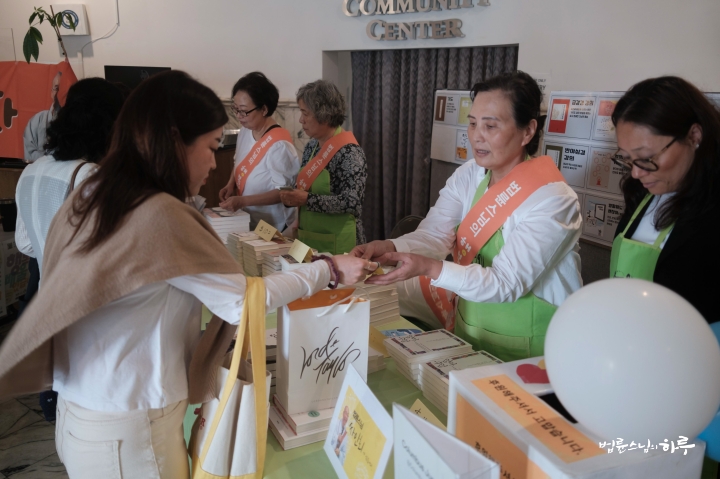
From 1:30 PM, Sunim had a meeting in the waiting room with Professor Janice Shin from Hofstra University on Long Island. Professor Shin has been conducting a ‘Support Program for Preschool Children with Developmental Disabilities’ with university students in Vietnam and Laos, achieving good results. She has been working for several years to collaborate with JTS on this project. This time, she proposed conducting a small experiment in Cambodia before potentially expanding the project to Myanmar, the Philippines, and other areas. The professor said she feels energized after meeting with Sunim and promised to create a clearer proposal.
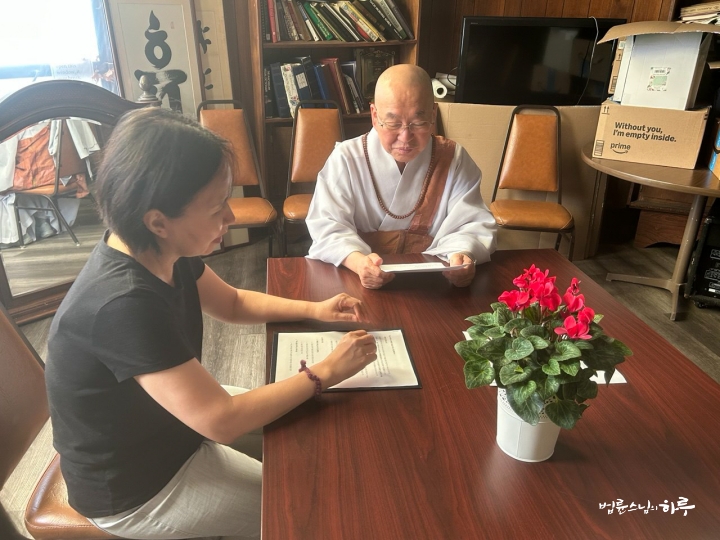
After the meeting, it was time to begin the Dharma talk. Following the introductory video about Sunim, he took the stage. With over 240 people filling the venue, applause and cheers erupted. Sunim began the conversation by emphasizing the chaos caused by reduced international aid since Trump’s election and the role and attitude of individuals within this context.
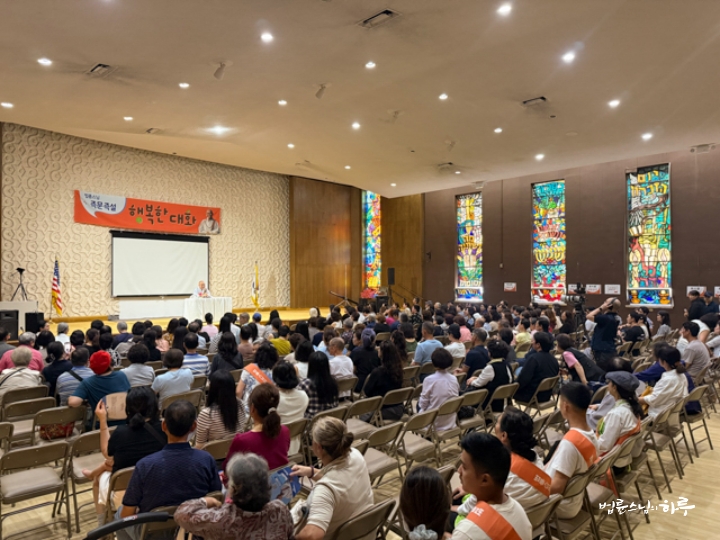
“I don’t know if you voted well, but since President Trump was elected, the whole world has been in turmoil. It’s not just about Korea-US relations; the entire world is in confusion. Particularly in Southeast Asia, programs that were supported by USAID have suddenly been cut off.
The Trump Era: Gaps in International Aid and Small Efforts for Peace
Since I’ve been helping poor people in Southeast Asia for a long time, I’m receiving requests for support from various places. However, it’s difficult for an individual to replace what the US government was doing. Due to the civil war in Myanmar, many refugees have emerged – Rohingya people crossing into Bangladesh, and Shan and Karen people crossing into Thailand. UNHCR had been providing support to ensure at least minimal survival, but with funding cut off, refugee camp operations have become extremely difficult. In a way, it makes you realize how much good work the US had been doing. The US government covered about 30 percent of total aid funding. Now that it’s stopped, only basic food supplies are barely being provided, and essential goods support has become nearly impossible.
While the current situation is chaotic, it’s still much better than the upheavals of World War II or earlier periods. Everything is relative, isn’t it? No matter what era or environment we live in, we must find happiness within it. At the same time, we must make even small efforts to make our society more peaceful and just. Only then can we prevent deterioration and create a better world.”
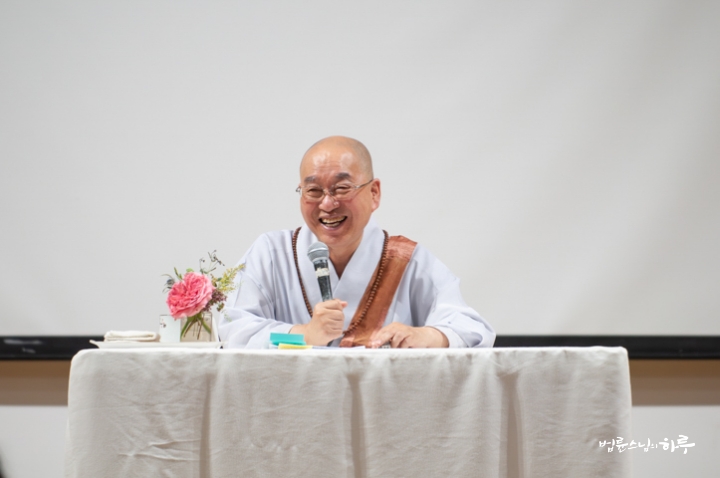
Next, anyone could raise their hand and ask Sunim questions. During the two-hour session, 12 people were able to have conversations with Sunim. One of them expressed anxiety about having to care for a mentally ill family member for life, saying that it was exhausting and difficult for them as well.
I’m So Anxious About Having to Care for My Sick Family Member for Life
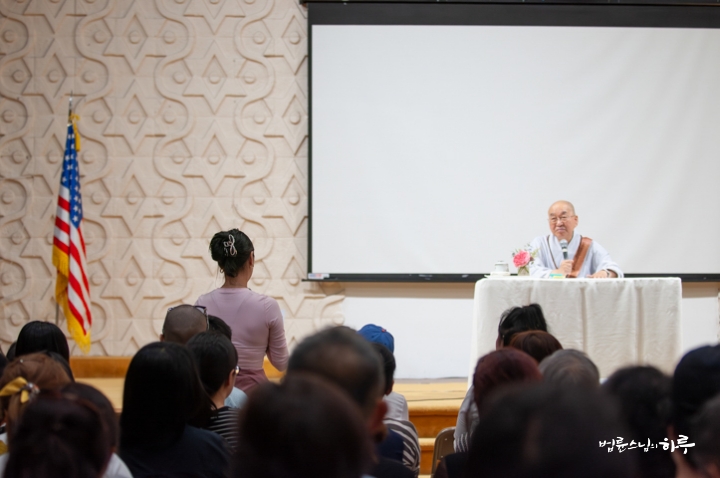
“Climate change is an objective fact. However, feeling fear when seeing that change is a subjective response. Practice isn’t about changing objective phenomena, but about reducing our fear of those phenomena. For example, having no customers at your store is an objective fact. But feeling stressed because there are no customers is a subjective issue. Practice doesn’t suddenly increase the number of customers. The meaning of practice lies in reaching a state where you don’t feel stressed even when there are no customers. So, if you don’t feel stressed even with few customers, would that help or not help with running your store?”
“It would help.”
“While praying doesn’t increase customers, since I feel less stressed, I can manage more efficiently, and as a result, it helps with running the store. But people approach it thinking, ‘If I practice, customers will increase, my illness will be cured, my child will get into college, my business will succeed.’ That’s why confusion arises about whether there’s spiritual efficacy or not.
The original purpose of practice is to stabilize our minds. It has no direct relationship with curing illness, business success, or passing exams. However, when the mind is stable, it helps with recovery from illness, contributes to store management, and gives strength for studying. We need to make this distinction. But when people connect it to ideas like ‘praying or practicing will bring more customers,’ problems keep arising.
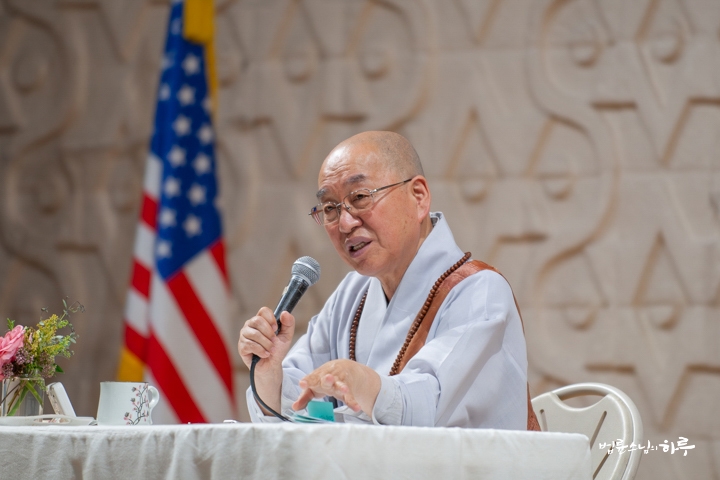
For example, let’s say a child loses the use of one leg in a traffic accident and needs a prosthetic, or suffers brain damage resulting in partial memory loss. Compared to before the accident, the fact that their physical and mental abilities have dropped to 75 percent is objective. In that case, parents and family members need to adjust their expectations and demands to match that 75 percent. However, many people cling to the past and live as if complete recovery is the only goal. If someone who was expected to die survives, we think ‘it’s effective,’ but when they remain at 75 percent, thinking ‘no matter how much treatment, there’s no effect’ is wrong.
If you had 10 billion won and lost it all in business, leaving only 1 billion won, you could actually live quite well with just 1 billion. But if you cling to the 10 billion you once had, you’ll conclude you’re ruined and might make extreme choices. Similarly, you’re clinging to the past.
Think about living with a dog for a moment. When raising a dog, you don’t expect it to ‘someday speak like a human and do work.’ However, you do hope it will be house-trained. If it can’t even do that, you’ll feel stressed. Even if a family member is sick or injured and their abilities remain at 75 percent, they’re still much better off than a puppy. If we can live with puppies that can’t even control their bowel movements, why can’t we live with people? The reason we can’t is because our expectations are too high. You keep feeling stressed because you’re using 100 percent as the standard. So you need to lower your standards and think, ‘It’s fortunate they can even walk.’
When determining whether a person can maintain their dignity, there are two most important criteria. First, can they feed themselves? Second, can they control their bowel and bladder? If they need tubes in their throat or nose to eat, it’s difficult to maintain dignity. If they can’t control their bowel and bladder and others must take care of it, life itself becomes very difficult. But if they can do these two things themselves, nothing else is a big problem. If you lower your standards this way, you can live with anyone. If you keep asking ‘Why did you lose things?’ or ‘Why couldn’t you arrive on time?’ it’s difficult to live with anyone.
The doctor’s mention of 75 percent recovery is just a rough expression. You should understand it as meaning not to have too high expectations since it’s below normal levels. So don’t set your expectations at 75 percent, but at survival. Can they eat by themselves? Can they control their bowel and bladder? If these two things are possible, that’s enough. If you visit hospitals, you’ll see many people who can’t feed themselves or control their bodily functions. When you actually care for such people, you realize how arduous and difficult that work is. It’s hard when you’re in that position yourself, but it’s also no ordinary task for the caregiver. When these two issues aren’t resolved and then one day they are resolved, nothing else becomes a problem.
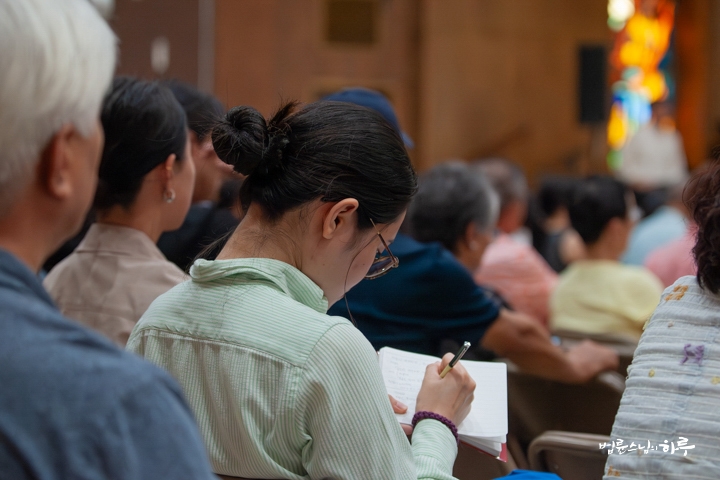
You’re worrying like this because you haven’t experienced such a situation. Once you actually go through it, you’ll come to your senses and realize how fortunate your family situation is. After experiencing this for just a year or two, your perspective will change to ‘What’s the problem if they can feed themselves and use the bathroom on their own?’ Don’t fixate on the 75 percent figure. Just focus on these two things: ‘Can they feed themselves? Can they use the bathroom independently?’ If they can do these things, there’s no problem at all. The rest is just helping when needed. I hope you can adopt this perspective.
Also, worrying about your parents’ family issues, which aren’t even your immediate family, is overstepping. You’re worrying about this because life is still manageable. Whatever happens with your parents’ side, just think ‘I see’ and let it go. There’s no need to worry about it. Only by changing your perspective like this can you live more peacefully.”
“I understand.”
Questions continued one after another.
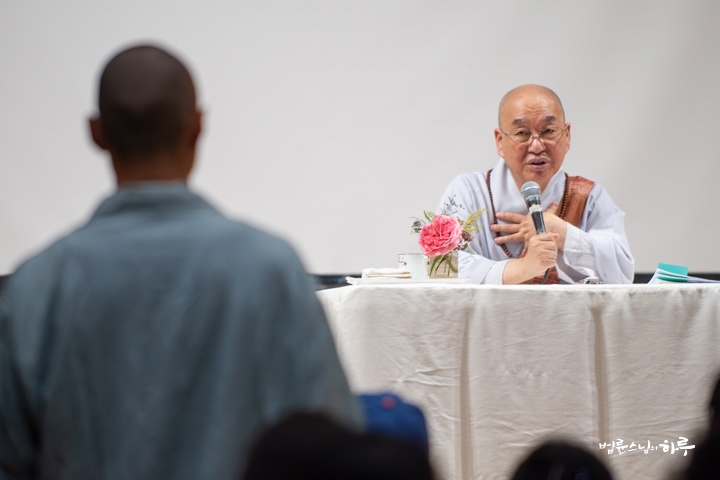
How do you tailor your dharma talks to each individual’s capacity?
I see others’ faults more clearly than my own. What practice would be helpful?
I’ve been experiencing my husband’s anger and verbal abuse since pregnancy and am now raising a 3-year-old. If I divorce my husband, with whom I haven’t spoken for over a year, how should I live?
I’m curious about what it means to become a wise adult.
What concerns do you have, Sunim?
I’ve been living using anger and rage as my energy source. From a religious perspective, why should we control anger?
After becoming very ill, I’m wondering how I should live my life.
You’ve been practicing and praying for over 30 years. What changes have you experienced?
I want to live feeling peace of mind, but I’m becoming more aggressive as I age.
Among the questioners, some expressed their gratitude to Sunim.
“My mother, who has cancer, asked a question at your last dharma talk and has been courageously fighting cancer since then. I wanted to express my gratitude to you.”
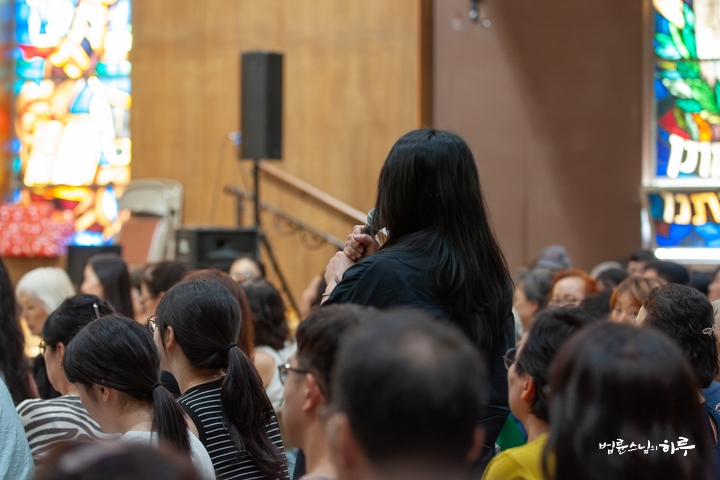
Sunim wanted to take more questions, but had to conclude the dharma talk after two hours as he needed to travel to Manhattan, where traffic is heavy, for an English-interpreted Dharma Q&A.
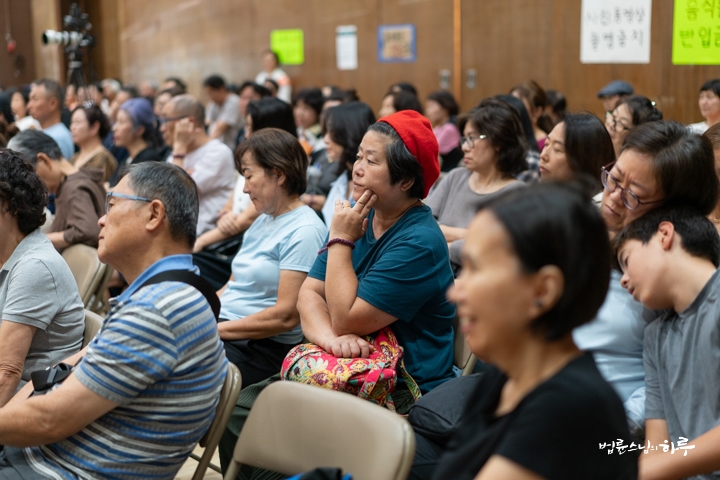
After the dharma talk, many people purchased books and received Sunim’s autograph. One elderly person in particular came to get autographs after purchasing more than 10 books. When Sunim asked, “Why are you buying so many books?” the elderly person smiled and replied.
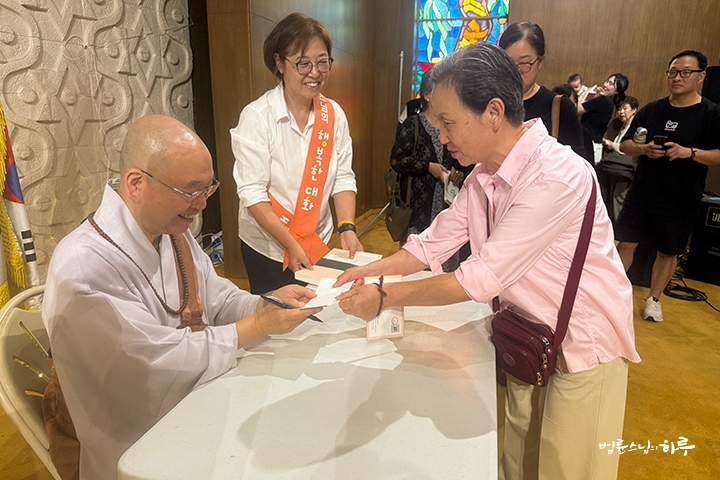
“Even if I meet you again in the future, how many more times will I be able to see you? I bought many books because I wanted to look at your face longer while you sign them.”
Someone who introduced themselves as a Catholic said they watch Sunim’s YouTube videos diligently and handed over an envelope with a donation, saying it was to contribute to good work. Many people expressed their gratitude, saying they had become happy after listening to Sunim’s dharma talks.
After the book signing, Sunim took a commemorative photo with the dharma talk volunteers.
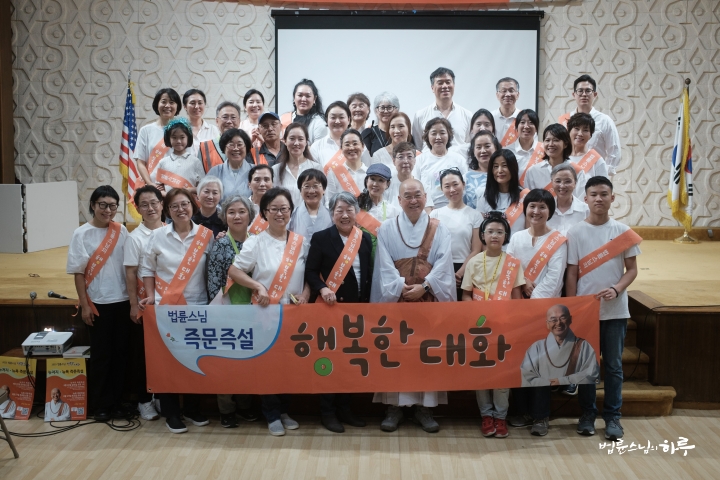
Sunim presented signed books to Park Mi-kyung, who was in charge of the dharma talk, and Kwon Young-mi, who was the deputy coordinator, and took a commemorative photo together.
“Thank you for all your hard work preparing for the dharma talk.”
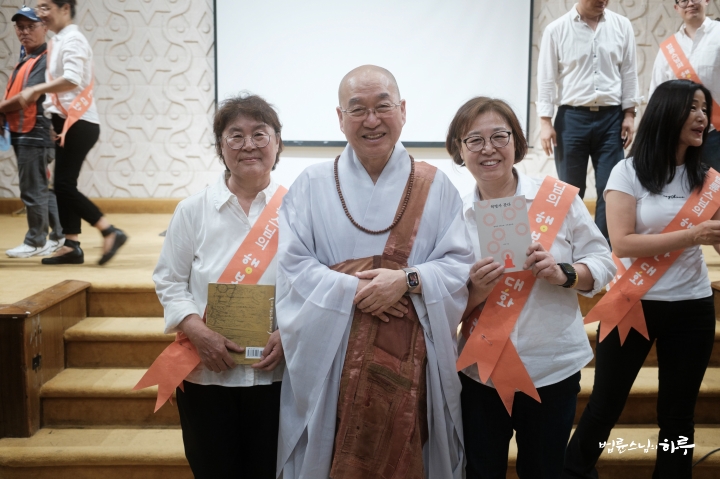
After expressing gratitude, Sunim waited in the car while Dharma Teachers Myodeok and Beophae had a sharing session with the volunteers.
After wrapping up the dharma talk, they departed for Manhattan at 4:45 PM. Due to the UN General Assembly, there was concern about arriving on time as traffic was heavy yesterday, but fortunately, traffic was less congested than yesterday. They considered taking the subway but decided to travel by car instead.
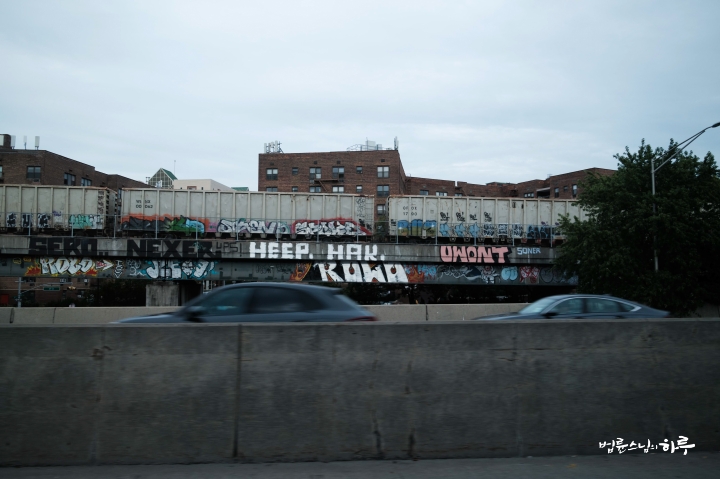
Today’s English-interpreted dharma talk was held at The Blanc Art Space. It’s a multi-purpose art space used for art exhibitions, performances, lectures, talks, and art-related events.
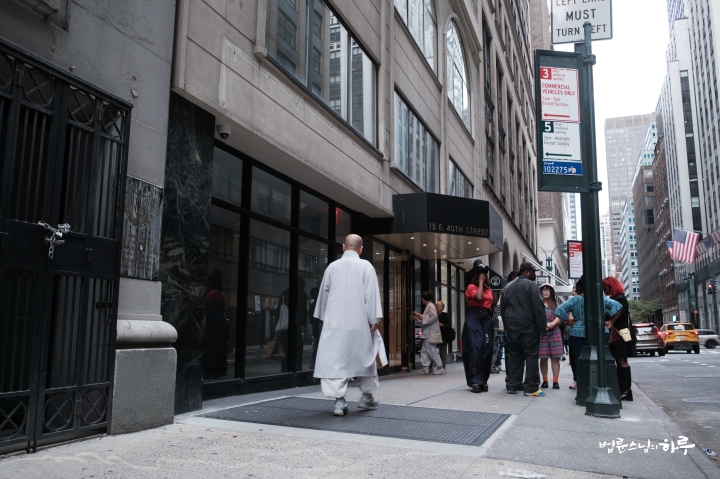
Arriving at the venue at 5:45 PM and going up to the 12th floor where the dharma talk was held, volunteers were busy setting up. After warmly greeting the volunteers, Sunim moved to the waiting room.
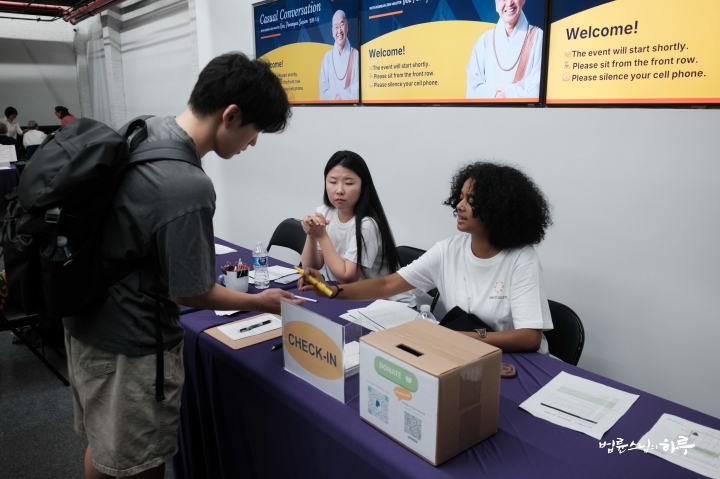
Eleven Jungto Dharma School students and graduates were scheduled to attend this English-interpreted dharma talk. Before starting the dharma talk, Sunim had a conversation with the Jungto Dharma School students in the waiting room from 6:30 PM.
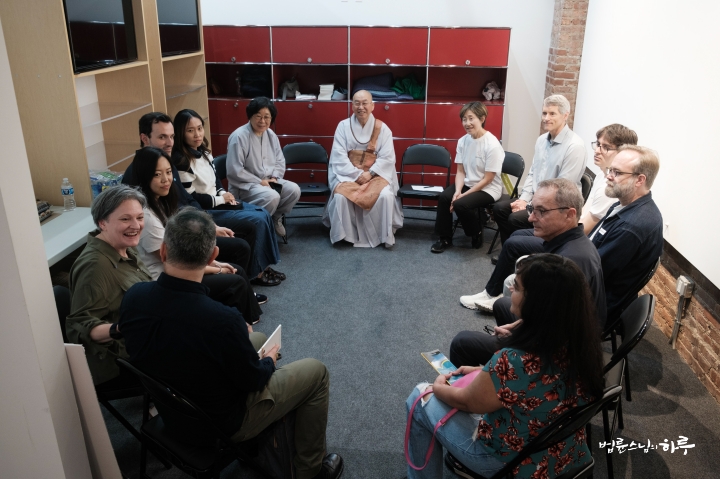
After listening to each person’s reflections on their Jungto Dharma School classes and how their lives had changed, Sunim answered questions about their curiosities. While most came from New York and New Jersey areas, one person came from Virginia, one from Boston, and one from Connecticut, making it a meaningful time to have direct conversations with Sunim.
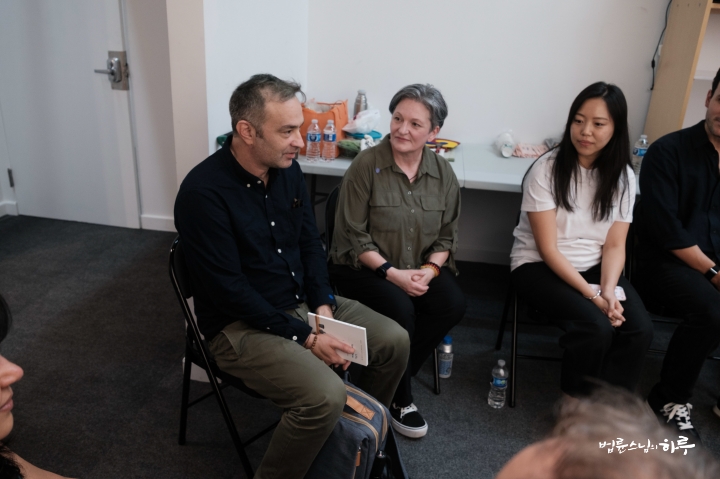
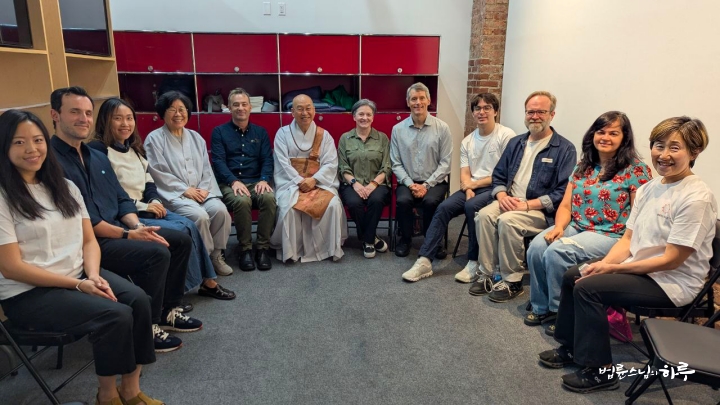
At 7 PM, everyone moved to the lecture hall together. Rafael, a Jungto Dharma School graduate, performed a celebratory guitar performance. The beautiful guitar playing brightened the atmosphere as it welcomed the audience.
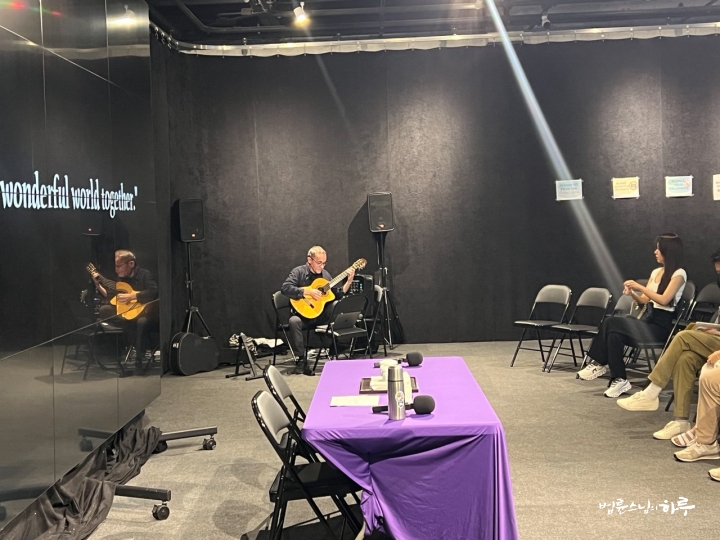
About 80 American citizens filled the cozy lecture hall. When Sunim and Jason, who was interpreting, headed to the stage, loud applause erupted. First, Sunim gave his greeting.
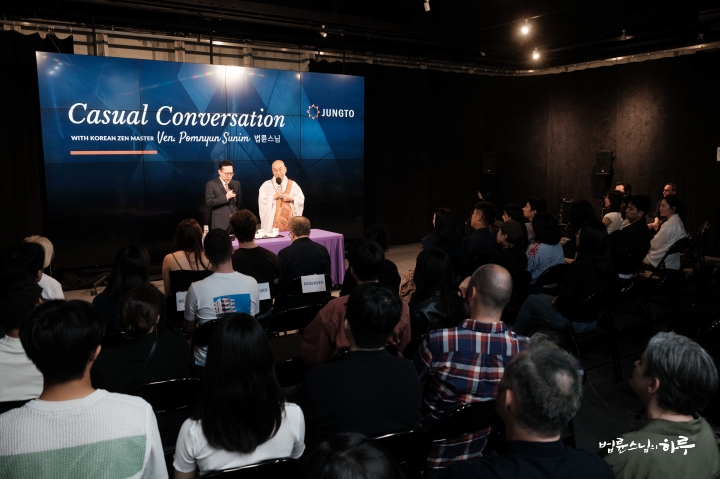
“Just yesterday, Manhattan was so congested that we thought cars wouldn’t be able to move properly, but today, perhaps because it’s the weekend, it’s fine. Was it difficult for everyone to come?”
“Yes, it wasn’t difficult.”
“That’s good.”
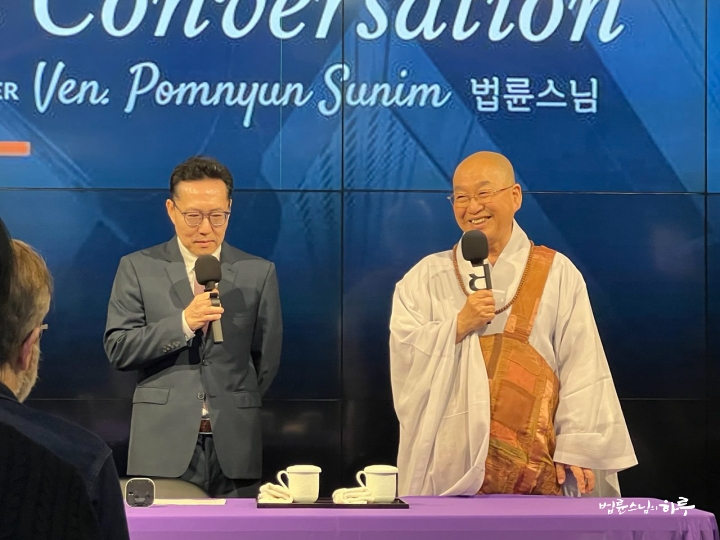
Following this, Sunim took 3 pre-submitted questions and 8 on-site questions. They had conversations on various topics for an hour and a half. One person sought Sunim’s advice, saying that anger and hurt from conflicts with employees in their organization still remained, and they wanted to find peace of mind within that situation.
How Can I Manage the Anger That Remains After Conflicts with Employees?
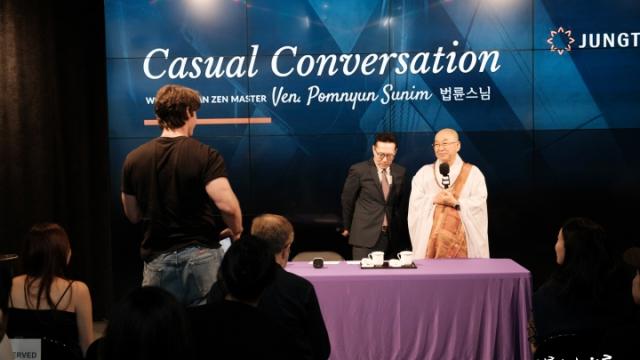
“If that’s the case, it’s better to live alone. To live with people, you need to accept that everyone thinks differently. Even married couples think differently, and even children I’ve raised think differently from me. It’s only natural to accept that employees in the workplace think differently from me.
When running any organization or workplace, you need principles. You also need to share the fact that violating those principles can lead to dismissal. While you can fire someone for breaking rules, you shouldn’t fire them personally out of anger just because they didn’t listen to you. That’s because people are naturally different from each other. Instead, you can handle things according to the agreed-upon principles.
But if you’re stressed thinking about those people, that’s not their problem. It’s your own problem. Hating someone ultimately means you’re suffering. Just thinking ‘How can I curse them?’ becomes suffering for you. This suffering isn’t given by others but created by yourself. In other words, they’re not tormenting you; you’re tormenting yourself.
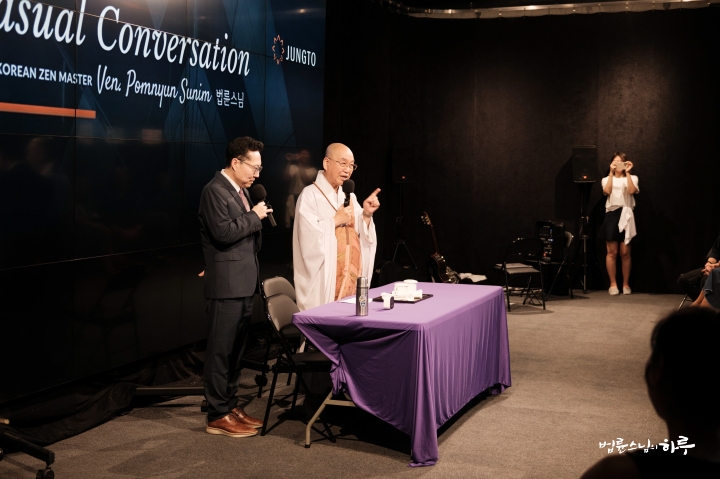
First, it’s important to realize that you are tormenting yourself. When you’re caught up in these thoughts, it becomes difficult to run an organization efficiently and rationally. When hiring new employees, you might fear, ‘What will happen this time?’ Of course, a similar person might come again. In such cases, you should turn it into experience by thinking, ‘I’ve already been through this before, so I’ll be fine now.’ However, for you, this memory has remained as trauma rather than experience, making your present and future fearful. You need a process to heal the trauma and transform it into experience. Even if it was difficult the first time, you should be able to resolve it more easily the second time by utilizing your previous experience.
Second, you probably have strong pride in doing good work, which might make you think ‘I am right’ quite strongly. However, anyone can have different thoughts from yours. You need to acknowledge this fact and find common ground from there. Without establishing this perspective, all human relationships become difficult – whether in marriage, raising children, or running a company. What’s important is not that people around you agree with you or conform to your views, but that you acknowledge and understand people who are different from you.
You can fully understand someone and still choose not to go along with them. It’s not because they’re bad or wrong, but because you can make different choices. Divorce works the same way. You can divorce not because you hate the other person, but because you’re different from each other and you’re making a different choice. The same applies to religion. Whatever religion you choose among many is your freedom. You shouldn’t think that the religion you chose is right and the ones you didn’t choose are wrong. Similarly, while it’s your freedom to choose certain people, you shouldn’t view others as problematic.”
“I have two small questions. I understand that in marriage people are entitled to have different opinions, but at work, don’t you have to follow what your boss says? I think one of the reasons this experience became trauma instead of just an experience was because I had this enormous fear of letting people go and speaking up the truth-that others didn’t want to hear. They were acting out really badly and I just had a very difficult time. What they were doing was not work –appropriate and, stuff like that, and it just went on for way too long. I guess I want to be free of that fear.”
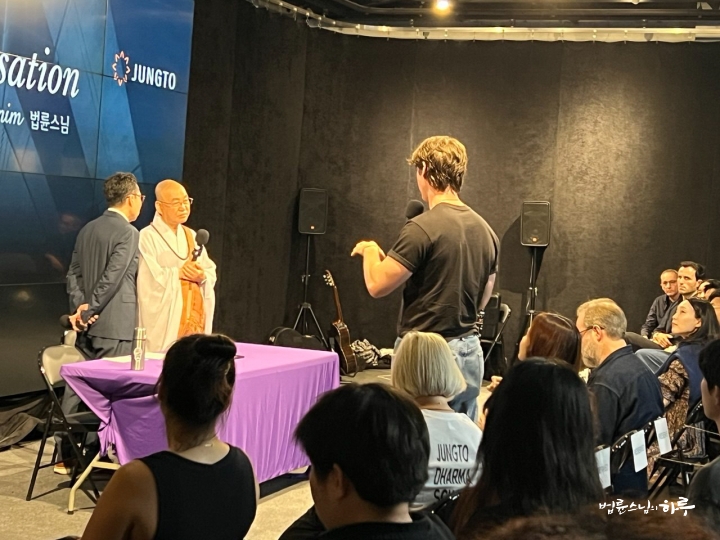
“The reason you can’t point out others’ problems or fire them isn’t because you’re kind, but because you want to be seen as a kind person and receive good evaluations. That’s why you can’t say things others don’t want to hear. Not being able to speak honestly to your boss is due to fear of disadvantage, and not saying uncomfortable things to others is because you want to be seen as a good person. You’re not actually a kind person, are you? So it’s okay to receive some criticism. Even Jesus received much criticism. Beyond being criticized, he was crucified and killed. Buddha also received countless criticisms. So wanting to avoid criticism means you think you’re more admirable than Jesus or Buddha. That’s a wrong perspective. You need to accept that you can do good work and still be criticized. To accomplish anything, you sometimes have to accept criticism.
I’m currently facilitating dialogue between South and North Korea, and between the US and North Korea. To do this, I have no choice but to tell people to acknowledge and understand the other side. When I say this, people misunderstand and think I’m taking the other side. However, dialogue is only possible when we acknowledge and understand the other party, despite such misunderstandings. Not being able to fire or criticize is ultimately your own problem of not wanting to be criticized, not the employees’ problem.
Even subordinate employees should be able to freely express their opinions if they have them. We need to have discussions, and when conclusions are reached through discussion, we should follow those results. The idea that ‘subordinates must unconditionally listen to their superiors’ is wrong, especially in an NGO. Korea’s MZ generation absolutely doesn’t agree with such methods. So you need to change this aspect. You should listen carefully to their opinions, consider different viewpoints, and make rational decisions. When they don’t accept even these rational decisions, that becomes grounds for dismissal. However, you shouldn’t suddenly fire people like President Trump does; you need to give warnings first and follow proper procedures.”
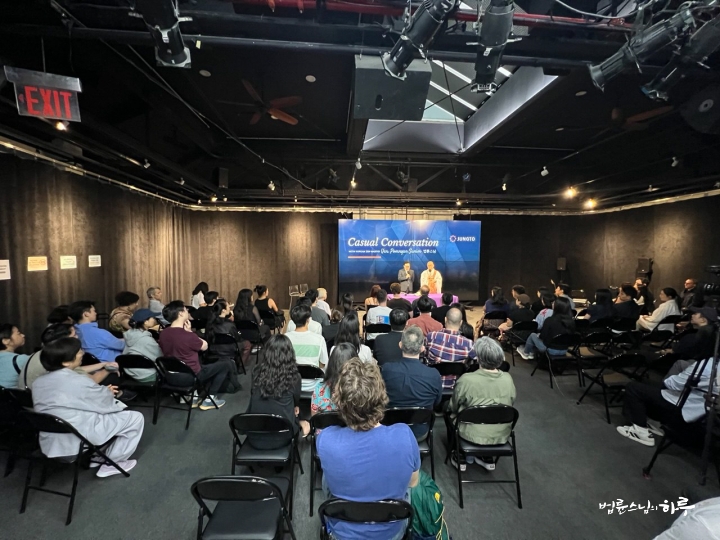
“I did let my employees speak very freely. Debate and open discussion were part of our culture. So it’s not as if I imposed my opinion or orders – it’s just that from the very beginning, I think my problem was listening to other people too much.”
“Yes, even so, the fact that conflict arose means it’s not just the subordinate’s problem – you as the supervisor also bear some responsibility. Conflicts can arise in any organization. But right now, you’ve been hurt by this incident. If the supervisor was hurt this much, imagine how difficult it must have been for the subordinate? You need to look at this from a broader perspective.”
“Thank you. I understand.”
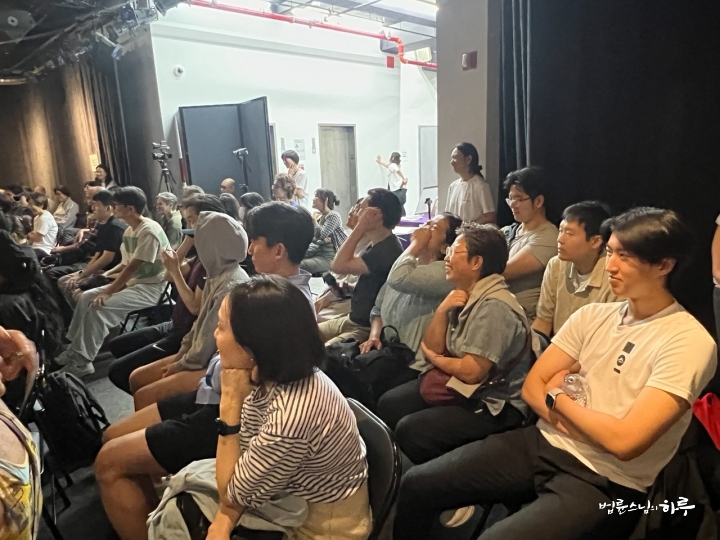
Questions continued one after another. Rather than current affairs, most questions were about personal concerns.
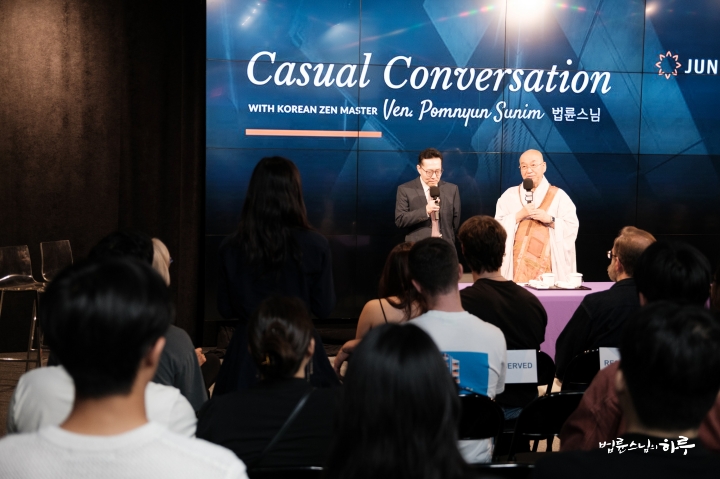
Since my father’s suicide in high school, life feels meaningless and I can’t find motivation to live. How should I change?
I want to know about daily awareness and enlightenment, not just conceptual understanding of Buddhism. What kind of enlightenment and awareness do you experience in each moment?
Since America is a Christian nation, it seems people’s beliefs are based on fear of angering God. Is it possible to have morality that isn’t based on fear?
I grew up under the influence of fundamentalist Judaism. Having experienced fear and manipulation, I want to pursue new spiritual practice but feel cautious.
Due to difficulties running a nonprofit organization, I experienced having to fire employees and downsize. Because of those memories, I feel afraid to hire new employees.
I live in the world based on what I know, but what attitude should I have toward what I don’t know?
I dream of establishing and running a good organization after graduation, but I was recently diagnosed with anxiety disorder and depression. I worry about what will happen if my depression worsens after starting the company.
After getting a job, I was taking medication for stress and anxiety but stopped due to physical difficulties. I’m considering taking it again but worry about side effects.
I’m financially dependent on my parents. Should I unconditionally become independent from my parents when I turn 19? What should I do in my case?
I’m a college freshman with vague fears about my major and future career.
I calculated the support I received from my parents as a child in monetary terms and gave it to my mother, but she wants to give it back. I’m worried because my mother seems to be in danger but doesn’t realize it.
After answering all the questions, it was nearly 9 PM. The lecture ended with loud applause.
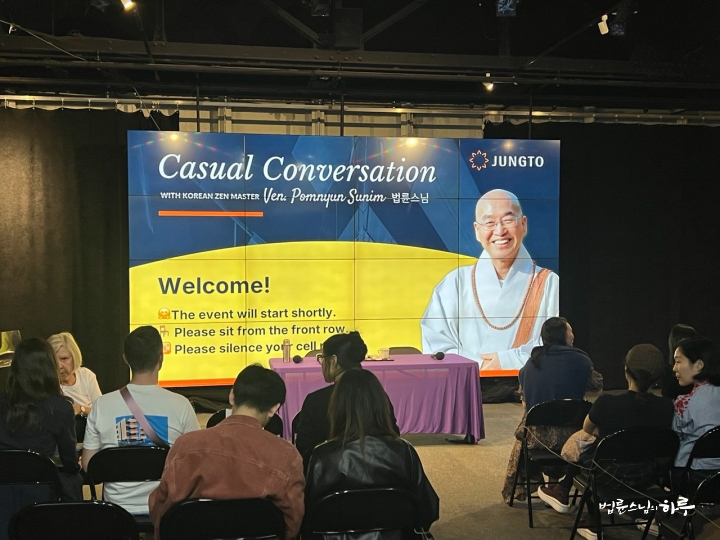
Although an official book signing wasn’t scheduled due to the need to vacate the venue on time, audience members who purchased books naturally requested autographs. Sunim returned to the table on stage and held an impromptu 10-minute signing session. The faces of those leaving with autographs were full of smiles.
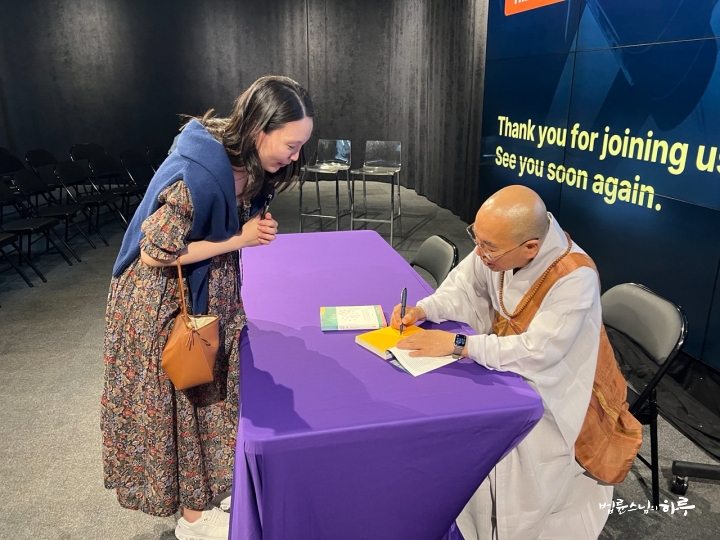
Venerable Go, who had invited Sunim to Columbia University last year, also attended and thanked Sunim. A student from Harvard University asked Sunim to please come to Harvard next year for an English interpreted lecture.
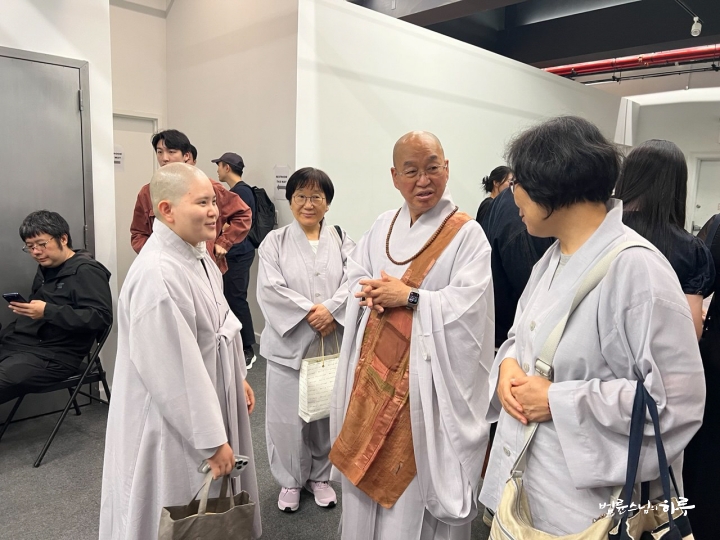
Sunim took a commemorative photo with the volunteers who prepared the lecture.
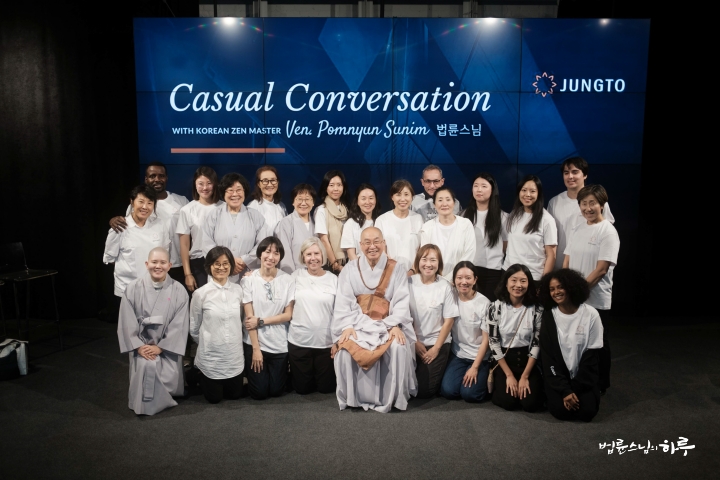
After the photo session, Sunim presented books as tokens of appreciation to Kim Min-ji, the overall coordinator; Lee Aram, the deputy coordinator; Sue Strong, who served as MC and secured the venue; and Rafael, who played guitar.
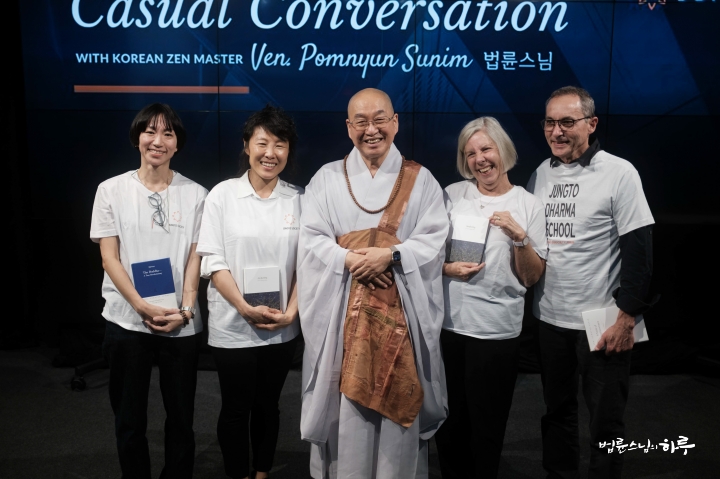
Sunim thanked the volunteers who prepared the lecture for their hard work before heading to his accommodation.
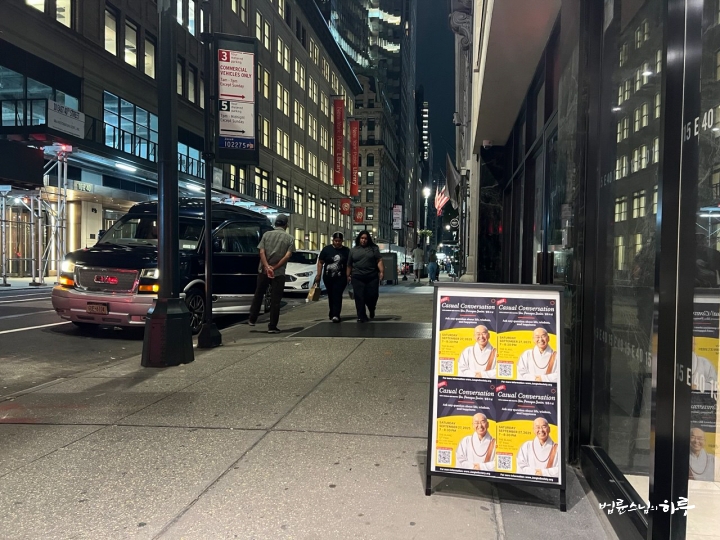
The volunteers then had a mindful sharing session with Dharma Teacher Beophae. Since this lecture included local volunteers, the entire process was conducted in English. Everyone shared their impressions from the lecture in English as well. They all said it was an opportunity to vividly experience the Mosaic Buddha.
“It was truly wonderful to be able to participate together. I’d like to attend again if there are more events like this in the future. I’m grateful to feel that such positive things are happening here in today’s society where so many negative things occur.”
“It was an opportunity to realize that I can’t do anything alone, and it was a chance to truly feel that we are the Mosaic Buddha.”
While several English interpreted lectures have been held in New York, they were either university-invited lectures or prepared by Korean Jungto Society members. This English interpreted lecture was particularly meaningful as it was the first New York lecture where local people also participated as volunteers.
Sunim returned to his accommodation at 9:50 PM, had a late dinner, and concluded his day.

Tomorrow, he will fly to Toronto, Canada, where he will give an English interpreted lecture for locals at the University of Toronto at 1 PM, followed by a Dharma Q&A for Korean immigrants at 5 PM.





